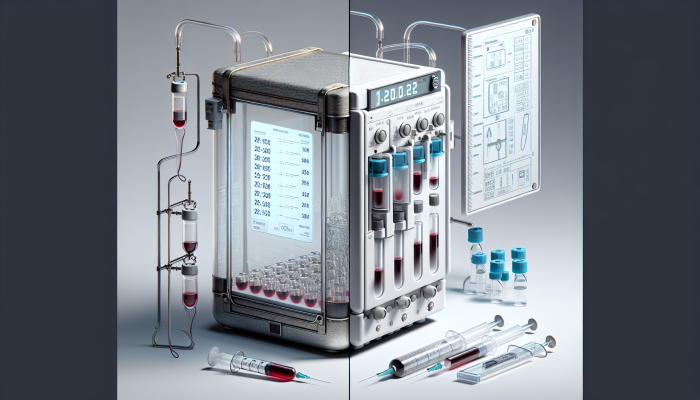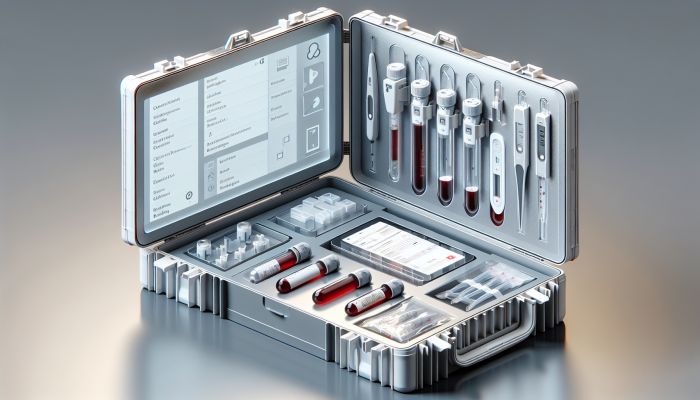Revolutionize Your Healthcare Practice with Advanced Blood Sample Transport Solutions
Blood test transport kits represent a crucial element in today’s healthcare ecosystem, ensuring the secure and efficient delivery of blood samples to testing laboratories for accurate analysis. As healthcare systems advance, it is essential that the tools supporting these processes, including transport kits, also adapt accordingly. This evolution underscores the critical role these kits play in maintaining the integrity of blood samples. Recent innovations focused on safety features and compliance with health regulations have transformed blood test transport kits, enabling healthcare providers to enhance patient outcomes through reliable and effective testing practices.
Transitioning from Outdated Blood Sample Transport Techniques to Modern Innovations

In the past, the methods used for blood testing were reliant on basic transport techniques, frequently employing rudimentary containers that offered limited protection for vital samples. However, as our understanding of blood sample integrity has deepened, the necessity for more advanced and durable solutions has increased dramatically. Today’s blood test transport kits are meticulously designed with cutting-edge materials and technology, which effectively shield samples from external influences while ensuring optimal conditions throughout the transport journey.
Contemporary transport kits now include sophisticated temperature control mechanisms and cushioning materials specifically engineered to absorb shocks and vibrations during transport. These advancements have dramatically reduced the risk of sample degradation or contamination, which is essential for generating accurate and trustworthy blood test results. The transition from outdated methods to advanced technologies highlights the urgent need for innovation in the healthcare sector to improve service delivery and patient care.
Key Features to Look for in High-Quality Blood Test Transport Kits
An effective transport kit consists of several critical components that collectively guarantee the safety and security of blood samples. The primary container, typically made from robust and durable materials, is specifically engineered to prevent leaks and contamination effectively. Moreover, secondary packaging choices, such as insulated bags or shock-resistant boxes, provide an extra layer of protection during transit.
Accurate labeling is paramount, ensuring that samples remain identifiable and traceable throughout the entire transport process. Many modern kits now come equipped with temperature monitoring devices that notify users of any fluctuations that could compromise the integrity of the samples. Combined, these features create a comprehensive system designed to address the various challenges associated with the secure transport of blood samples, ensuring safety and compliance with industry standards.
Navigating Regulatory Compliance: Key Guidelines for Blood Test Transport Kits
Compliance with regulations regarding the transportation of biological materials is crucial for ensuring safety and preserving sample integrity. Various health authorities and organizations establish guidelines that govern the design and utilization of blood test transport kits. Prominently, the World Health Organization (WHO) and the Centers for Disease Control and Prevention (CDC) provide detailed protocols to guarantee the safe handling and transport of blood samples.
These regulations encompass packaging standards, labeling requirements, and temperature control measures. Adhering to these guidelines is vital not only for protecting the integrity of samples but also for safeguarding healthcare providers and patients from potential health hazards that may arise from improper transport practices. Therefore, selecting compliant kits is an essential consideration for any healthcare provider engaged in blood sample testing.
Enhancing Patient Experience through Innovative Blood Test Transport Solutions

As healthcare systems continue to evolve, the emphasis on patient convenience has become a fundamental aspect of medical innovation. Blood test transport kits significantly enhance the patient experience, especially with the growing trend of at-home testing solutions. By streamlining the processes involved in blood sample collection and transport, these kits play a pivotal role in creating a more patient-centered healthcare environment.
Boosting Patient Engagement with User-Friendly At-Home Blood Testing Kits
The advent of at-home blood testing has transformed the way patients manage their health. With the aid of blood test transport kits, individuals can easily collect samples from the comfort of their homes, eliminating the need for lengthy visits to healthcare facilities. This convenience significantly reduces patient stress while promoting proactive health management.
These kits are designed with user-friendliness in mind, often including clear instructions and all essential components for sample collection and transport. Furthermore, the safety features embedded in modern kits ensure that patients can return their samples to laboratories without the risk of contamination or degradation, thereby maintaining the reliability of test results.
Simplifying Blood Sample Collection and Transport for Healthcare Providers
For healthcare professionals, blood test transport kits simplify the often intricate processes involved in sample collection and transport. By providing a comprehensive solution that encompasses everything necessary for secure transport, these kits save valuable time and minimize the potential for errors. Healthcare providers can efficiently gather samples, package them according to established protocols, and send them for analysis with minimal inconvenience.
The design of modern kits also facilitates quick and easy access to essential components required for sample collection. This improvement enhances workflow efficiency, enabling healthcare providers to concentrate on delivering high-quality patient care rather than being bogged down by logistical challenges, significantly raising the overall standard of service in their practices.
Accelerating Test Results: Reducing Wait Times and Improving Healthcare Access

One of the most significant advantages of blood test transport kits is their capacity to minimize the waiting period for test results. By ensuring that samples are collected and transported securely and efficiently, these kits enable laboratories to process tests more effectively. This efficiency is particularly crucial in urgent care situations where timely diagnoses can have a profound impact on patient outcomes.
Moreover, blood test transport kits help bridge the healthcare access gap, especially in underserved regions, by simplifying at-home testing and transport processes. Patients who previously faced barriers to accessing testing services can now engage more readily with their healthcare providers, improving health management and overall outcomes.
Guidelines for Selecting the Best Blood Test Transport Kit
Choosing the right blood test transport kit is essential for ensuring the safe and effective transport of samples. With countless options available, healthcare providers must consider various factors influencing their decision-making process. This guide aims to highlight key considerations to facilitate informed choices when selecting a kit.
Assessing Your Needs: Key Elements in Choosing a Blood Test Transport Kit
When selecting a blood test transport kit, it is vital to evaluate the specific requirements of your practice or healthcare facility. Important factors to consider include the type of blood sample being collected, the expected duration of transport, and any temperature specifications that must be met during transit.
Different tests may necessitate specific conditions; for instance, some samples require refrigeration, while others can be stored safely at room temperature. Understanding these requirements is crucial for selecting a kit that effectively maintains sample integrity and guarantees accurate results upon analysis.
Analyzing Top Blood Test Transport Kits Available in the Market
The market for blood test transport kits is vast, featuring a wide variety of products that come with unique features and benefits. Comparing leading kits can provide valuable insights into the best options available. Key aspects to evaluate include the quality of packaging materials, temperature control capabilities, and overall user-friendliness.
Reviewing user feedback and case studies can also offer practical insights into the performance of different kits in real-world situations. By comparing the available options, healthcare providers can select a kit that aligns with their operational requirements and enhances service delivery.
Finding the Right Balance: Cost vs. Quality in Blood Test Transport Kits
Budget considerations are an undeniable aspect of any healthcare environment. However, achieving a balance between the cost and quality of blood test transport kits is crucial. While lower-cost options may seem appealing, they could compromise the safety and integrity of samples, potentially leading to inaccurate test results and the need for retesting.
Investing in high-quality transport kits typically provides long-term benefits, reducing the likelihood of errors and ensuring compliance with regulatory standards. By prioritizing quality over cost, healthcare providers can significantly enhance operational efficiency and improve patient satisfaction.
Emerging Trends and Future Prospects for Blood Test Transport Kits
As technology continues to progress, innovations in blood test transport kits are set to revolutionize the industry, promising enhanced safety, efficiency, and environmental sustainability.
Technological Advancements Transforming Blood Test Transport Kits
Recent technological developments have introduced sophisticated features within blood test transport kits. For instance, smart temperature monitoring devices can now provide real-time data concerning the conditions of blood samples during transit. This capability allows healthcare providers to promptly address any deviations that may threaten sample integrity.
Additionally, the integration of tracking systems enables continuous monitoring of samples throughout the transport process, further enhancing accountability and traceability. These innovations not only improve the reliability of test results but also bolster confidence among healthcare providers and patients alike.
The Role of Blood Test Transport Kits in Advancing Telemedicine Initiatives
The rise of telemedicine has transformed the healthcare landscape, with blood test transport kits playing a crucial role in this clinical evolution. By facilitating remote patient testing, these kits enable the collection and transport of samples for analysis without necessitating in-person visits. This integration enhances access to healthcare services, particularly for individuals residing in remote or underserved areas.
Moreover, the convenience of at-home testing options empowers patients to take a more proactive role in managing their health. By streamlining the entire process, blood test transport kits support the broader objectives of telemedicine, contributing to a more efficient and responsive healthcare system.
Advancing Environmental Sustainability in Blood Test Transport Kits
As environmental concerns gain more attention, the healthcare sector is increasingly focusing on sustainability. Innovations in blood test transport kits are now utilizing eco-friendly materials and designs aimed at minimizing environmental impact. For example, the use of biodegradable packaging options and recyclable materials is becoming more common in the industry.
By prioritizing sustainability, healthcare providers can contribute to global efforts to reduce waste and promote environmental responsibility. Choosing eco-friendly transport kits aligns with ethical considerations and resonates with patients who are becoming increasingly aware of and concerned about environmental issues.
Real-World Applications of Blood Test Transport Kits: Use Cases and Benefits
The versatility of blood test transport kits spans a wide range of practical applications in the healthcare field. These kits are essential for improving healthcare delivery, from rural settings to emergency scenarios.
Enhancing Healthcare Accessibility in Rural Areas through Blood Test Transport Kits
Access to healthcare services can often be limited in rural regions, making blood test transport kits invaluable tools. They provide a solution for patients in remote locations to obtain necessary tests without the burden of traveling long distances to healthcare facilities. This is particularly advantageous for populations facing mobility challenges or lacking reliable transportation options.
By facilitating the collection and transport of blood samples, these kits help bridge the gap between rural patients and essential healthcare services. This not only enhances health outcomes but also empowers communities to take charge of their health.
The Integral Role of Blood Test Transport Kits in Emergency Medical Situations
In the domain of emergency medical care, every moment is critical, and blood test transport kits act as essential tools in rapid response scenarios. These kits enable healthcare professionals to swiftly collect and transport blood samples from patients in critical condition, ensuring that timely analyses can be performed.
Emergency transport kits are typically designed for simplicity and efficiency, allowing healthcare providers to act swiftly and effectively. By minimizing delays in sample transport, these kits can significantly influence patient outcomes in urgent situations.
Maintaining Sample Integrity in Research and Clinical Trials with Blood Test Transport Kits
The reliability of blood test transport kits is critically important in scientific research and clinical trials. These kits are essential for the logistics of transporting samples between research facilities and testing laboratories, ensuring that samples remain uncontaminated and intact throughout their journey.
The stringent protocols governing sample transport in research environments demand high-quality kits that adhere to regulatory standards. By utilizing effective transport solutions, researchers can maintain data integrity and validate their findings, ultimately advancing medical knowledge and innovation.
Overcoming Challenges in Blood Test Transport Kits: Solutions and Best Practices
Despite their numerous advantages, blood test transport kits face several challenges. Addressing these common issues is essential for ensuring the safe and effective transport of blood samples.
Overcoming Temperature Control Challenges in Blood Sample Transport
One of the primary concerns when transporting blood samples is maintaining the necessary temperature conditions. Temperature fluctuations can jeopardize sample integrity, leading to inaccurate test results. To combat this issue, many modern blood test transport kits feature insulation and temperature control elements designed to regulate conditions throughout transport.
Implementing strategies such as using ice packs or gel packs can further assist in maintaining consistent temperatures during transport. Additionally, healthcare providers should receive training on best practices for handling samples to mitigate temperature-related challenges and ensure that the integrity of blood samples remains preserved.
Ensuring Timely Delivery of Blood Samples: Best Practices for Healthcare Providers
Timeliness is crucial in blood sample transport, especially in urgent care scenarios. To guarantee that samples are delivered promptly, healthcare providers must establish clear protocols for collection and dispatch. Utilizing efficient transport methods and tracking systems can facilitate the monitoring of samples’ progress, thus minimizing the likelihood of delays.
Furthermore, maintaining open communication with couriers and laboratories can enable quicker responses to unforeseen challenges, such as traffic disruptions or adverse weather conditions. By prioritizing timely delivery, healthcare providers can significantly enhance the efficiency of their testing processes.
Implementing Safety Protocols for Effective Handling of Blood Test Transport Kits
Proper handling of blood test transport kits is crucial for preventing accidents and ensuring compliance with health regulations. Healthcare providers must be well-informed about the protocols governing the safe handling and disposal of biological materials. This includes wearing appropriate personal protective equipment (PPE), following proper disposal methods for used materials, and securing samples in their packaging.
Training staff in these protocols can help mitigate risks and improve safety throughout the transport process. By fostering a culture of safety, healthcare providers can protect their team members and patients while ensuring the integrity of blood samples is maintained.
Expert Answers to Common Questions About Blood Test Transport Kits
What are blood test transport kits and why are they important?
Blood test transport kits are specialized packages designed to ensure the safe collection, storage, and transfer of blood samples to laboratories for analysis. They are engineered to keep samples uncontaminated and intact during transit, preserving their integrity for accurate test results.
How can I choose the right blood test transport kit for my specific needs?
When selecting a kit, consider factors such as the type of blood sample, anticipated transport duration, temperature specifications, and compliance with relevant regulations. Evaluating your specific needs will guide you in selecting the most suitable option.
Is it acceptable to use a generic container for transporting blood samples?
Using a generic container is not recommended, as it may not provide adequate protection or meet health regulations. It is advisable to use a certified blood test transport kit specifically designed for this purpose.
What should I do if a blood sample is compromised during transport?
If a sample is suspected to be compromised, it should not be used for testing. Notify the healthcare provider who collected the sample and follow established protocols for disposal and re-collection.
Are eco-friendly blood test transport kits available on the market?
Many manufacturers now offer eco-friendly blood test transport kits made from sustainable materials. These options are designed to minimize environmental impact while preserving the integrity of the samples.
What measures can I take to ensure the timely delivery of blood samples?
Establish clear sample collection and dispatch protocols, employ efficient transport methods, and maintain communication with couriers. Implementing tracking systems can also help monitor progress and prevent delays.
Do blood test transport kits require special handling procedures?
Handling these kits necessitates adherence to safety protocols, including wearing PPE and following proper disposal methods for biological materials. Training staff on these protocols is essential for maintaining safety.
What regulations govern the use of blood test transport kits?
Regulations vary by region but typically include guidelines from health authorities such as the WHO and CDC. These guidelines cover packaging standards, labeling requirements, and temperature control measures.
How have blood test transport kits evolved over time?
Blood test transport kits have advanced from simple containers to sophisticated systems incorporating temperature control, tracking technologies, and user-friendly designs, significantly enhancing the safety and reliability of samples.
Connect with us on Facebook!
This Article Was First Found On https://bloodtest.co.uk
The Article: Blood Test Transport Kits Revolutionising Healthcare Logistics appeared first on: https://ezbloodtest.com
The Article Blood Test Transport Kits Transforming Healthcare Logistics Was Found On https://limitsofstrategy.com

It’s intriguing to see how the evolution of blood sample transport solutions reflects broader changes in healthcare practices. I often think about how these advancements not only improve efficiency but also significantly impact patient safety and outcomes. The mention of safety features and compliance raises important questions about standardization in a field where a small oversight can lead to catastrophic errors.